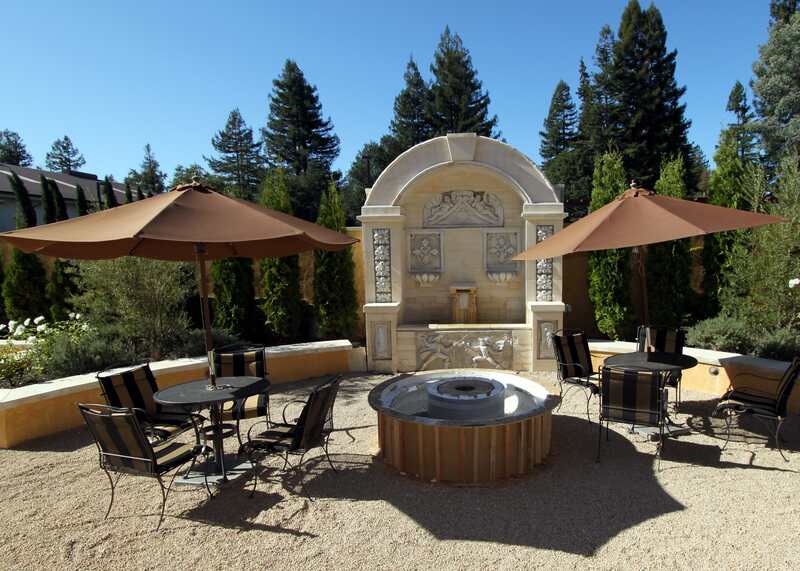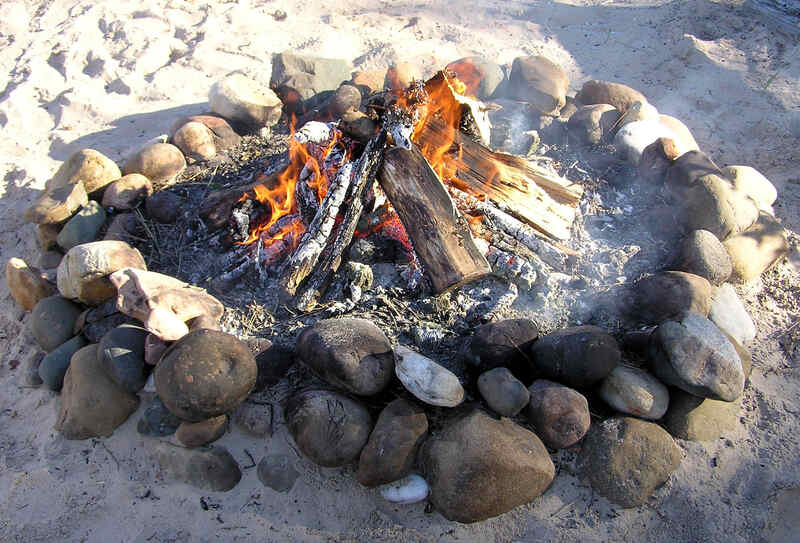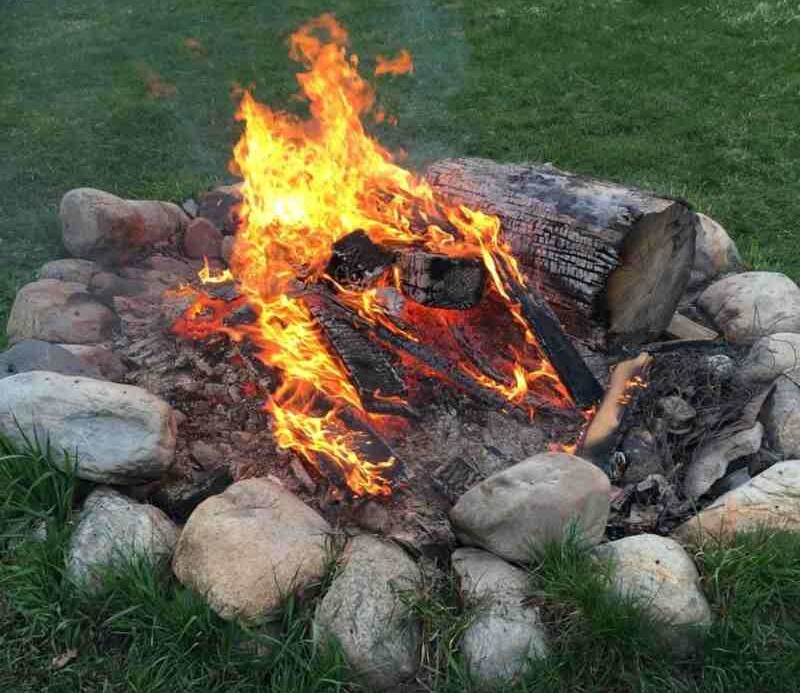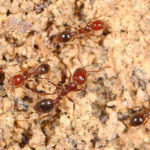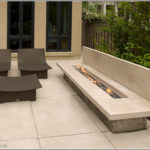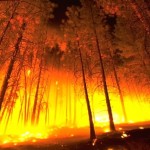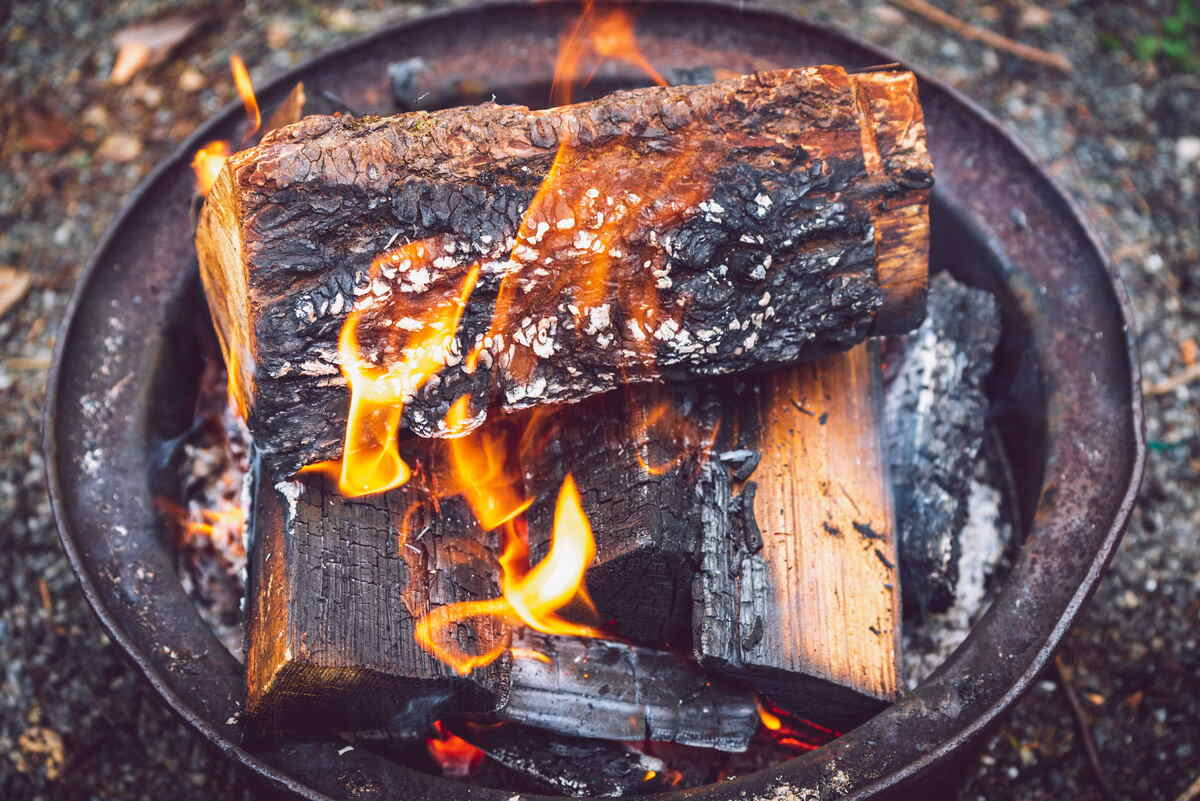
When the air is cool and crisp, there’s nothing better than gathering around a warm fire with friends and family. Something about the glowing warmth, the dancing light, and the crackling sounds make an evening outdoors extra special. Here are the 21 best fire pit ideas for your landscaping.
21 Fire Pit Ideas to Spark Your Imagination
If you’re looking to bring some added warmth to your outdoor space, options for adding a DIY fire pit are endless. From the simplest campfire to the most elegant outdoor fireplace, here are 21 outdoor fire pit ideas to warm you up.
1. Use Your Fire Pit as a Centerpiece
A well-constructed fire pit is more than just a place to get warm. It also can make for the perfect focal point of your yard or outdoor space. When done right, it can be a unique gathering place for friends and family, even when the fire isn’t burning.
Cost: Fire pits cost between $367 and $2,233. The cost of using a fire pit as the centerpiece of your outdoor living space will depend on just how ornate the fire pit is. It can be done with a simple, portable fire pit or something more permanent with stones and mortar. You’ll also want to consider the additional furniture or hardscaping that your fire pit may require.
2. Set Your Fire Pit Apart
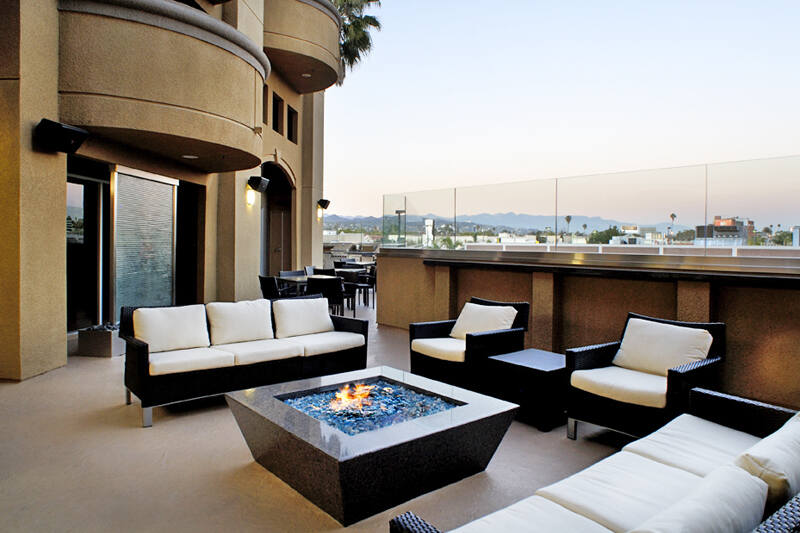
Tuck away your fire pit in its own area to be used when the weather warrants. Separating it from the high-traffic areas of the yard gives it a more intimate and functional feel, perfect for roasting marshmallows or keeping warm under the stars.
Cost: This depends on the fire pit you choose. This concept can be pulled off for under $250 or for thousands of dollars. The national average for a well-built fire pit is around $750.
3. Make it Part of Your Landscape
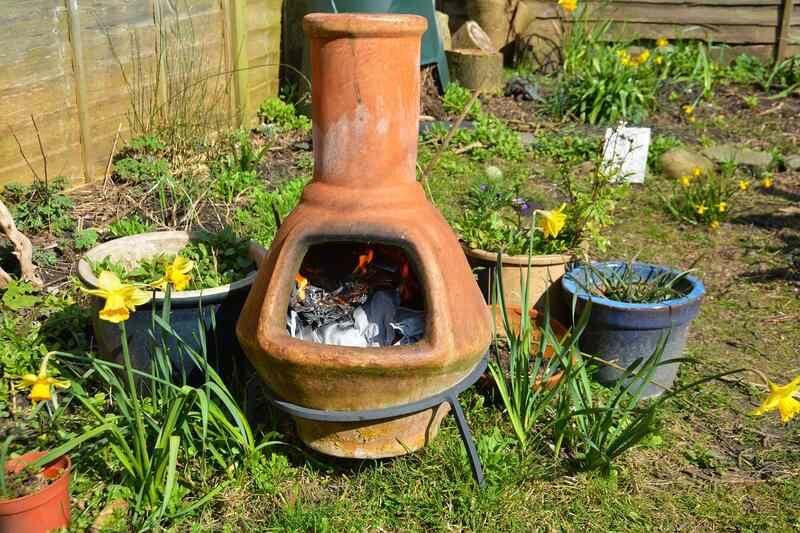
Fire pits with a natural feel can work well as a part of the greater landscape. Depending on your backyard patio design, this could mean a natural stone structure on a gravel fire pit patio or an in-ground fire pit surrounded by logs and foliage. Camouflaging your fire pit with the landscape means it will look like it belongs year-round.
Cost: The clay chiminea pictured above goes for around $350.
4. Add a Wall Around It
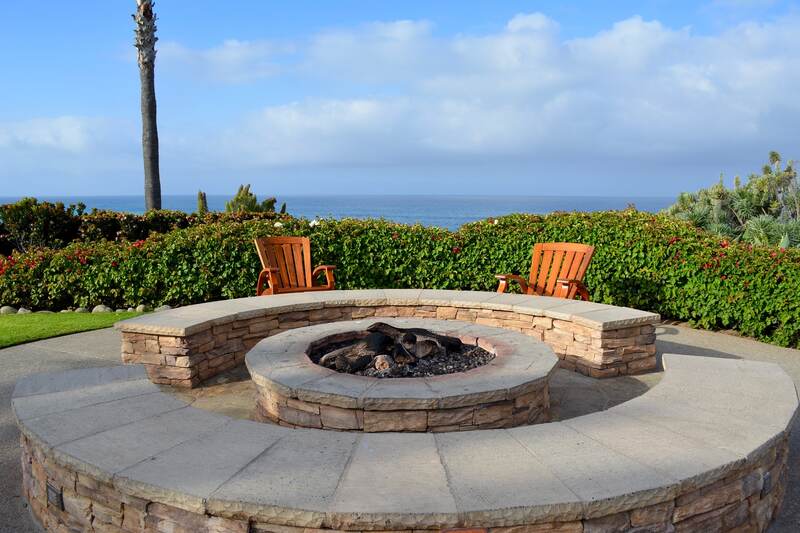
Adding a wall to the space can bring privacy, but it also has many other functions. For example, a low wall protects the area from wind, guards it from view, creates a backdrop, and even doubles as patio furniture.
Cost: A brick or stone wall typically ranges from $10 to $80 per square foot, depending on the style of stone and the thickness of the wall.
5. Make it Part of Your Outdoor Living Space
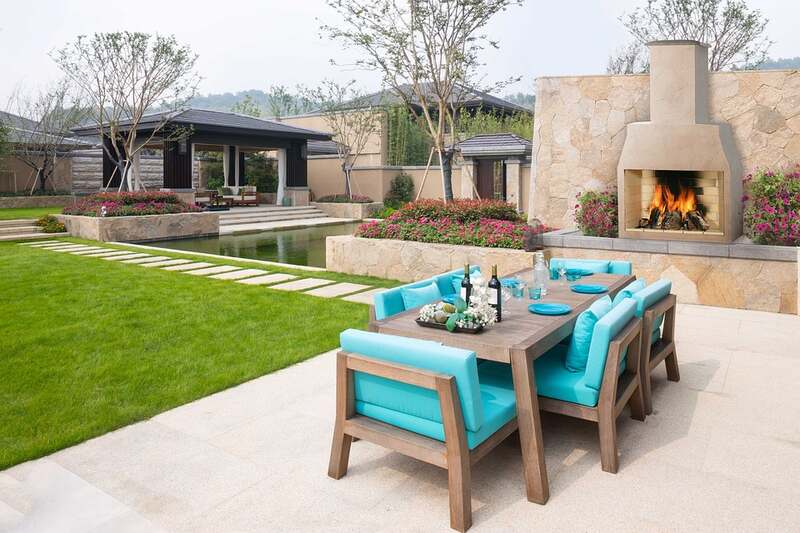
If your local weather allows it, nothing is better than a full-on outdoor living space. Outdoor kitchens, living rooms, and seating areas are the pinnacle of backyard design. Fire pits make a great addition to any outdoor living space, bringing a warm and glowing ambiance.
Cost: The designs you can choose for this type of fire pit will make the price vary widely, but an outdoor fireplace like the one above can range from $1,000 to as much as $20,000.
6. Choose a Tabletop Fire Pit
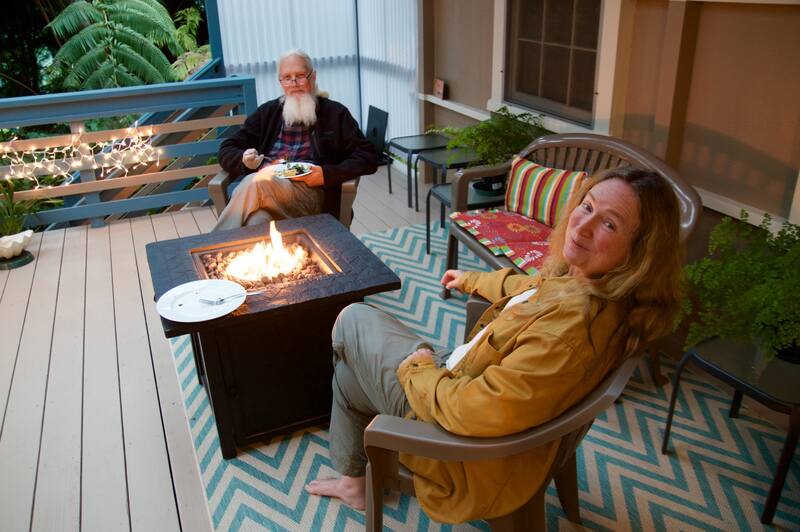
A fire pit table offers the best of both worlds: the function of a table with all the coziness of a fire. Plus, you’ll always have a place to set your drinks and s’mores.
Cost: Fire pit tables like the one above range from $200 to $3,000.
7. Surround it With Benches
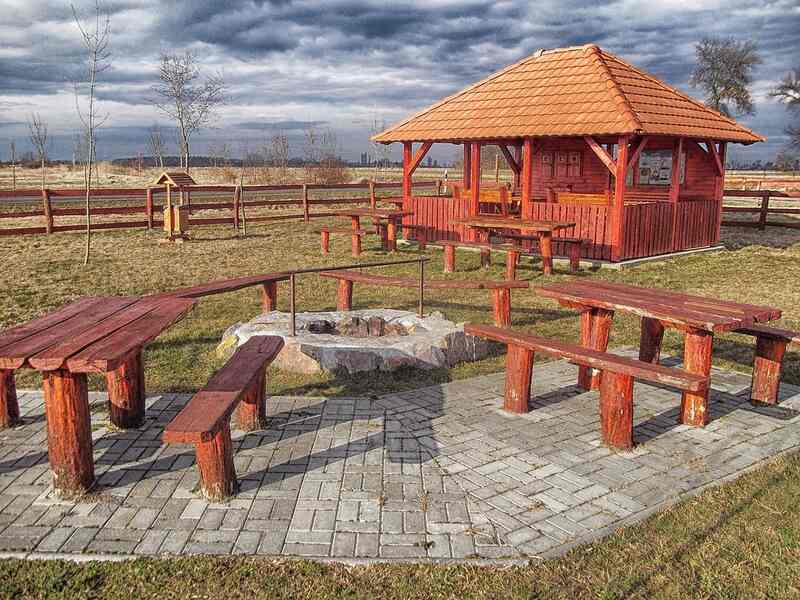
A fire pit is only as good as the seating area around it. So when selecting benches for your fire pit, you’ll have a wide range of options, from rustic wood benches to lavishly designed stone benches. Either way, benches will give everyone a seat at the fire.
Cost: You can make your own simple benches fairly easily for less than $100 or purchase fascia benches for as much as $400 per bench.
8. Pick a Portable Pit
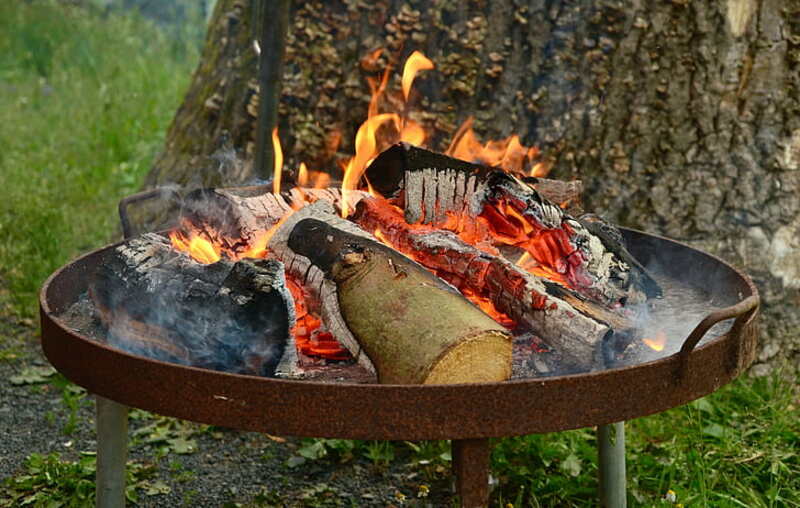
While a designated fire pit patio with a permanent fire pit is an excellent addition to any landscape, you might want to consider a portable fire pit that can be moved around the yard as needed. With a portable fire pit, you can bring the warmth of a fire from the backyard to the front yard as required.
Cost: A small, portable metal fire dish can be found for as cheap as $40. High-end portable fire pits will be closer to $400.
9. Keep it Simple
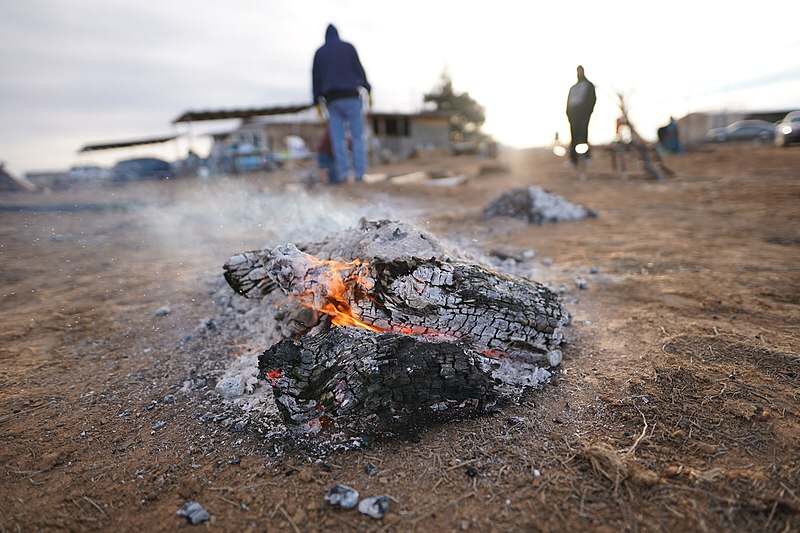
The easiest way to enjoy the coziness of a backyard fire pit is to keep things simple. Forgo the fancy fire pit designs and return to your campfire roots. All you need to do is clear out an area safe for a fire and get started. Consider using a cast iron bowl or a rock barrier to keep things in check.
Cost: Aside from the cost of wood or any additional fuel you might use, this option is free.
10. Make a Pit With Pavers
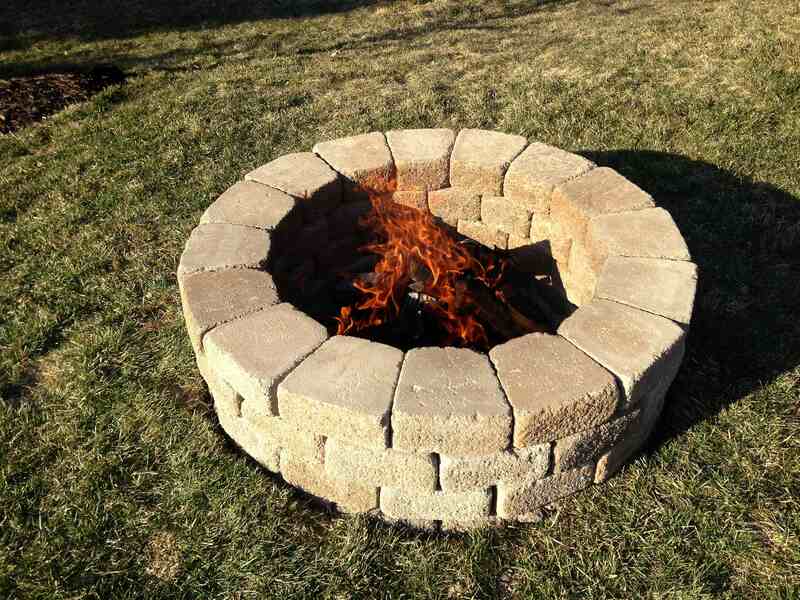
Do you have spare pavers left over from a hardscaping project? Stack them up to create a simple DIY fire pit. Not only is it an easy way to create a professional-looking brick fire pit, but it will perfectly match your other hardscaping.
Cost: If you have enough pavers handy, this project can be “free.” If you need to pick up new pavers, they’ll range from 50 cents to $10 per stone depending on the size and quality.
11. Build a Pit With Concrete Blocks or Cement
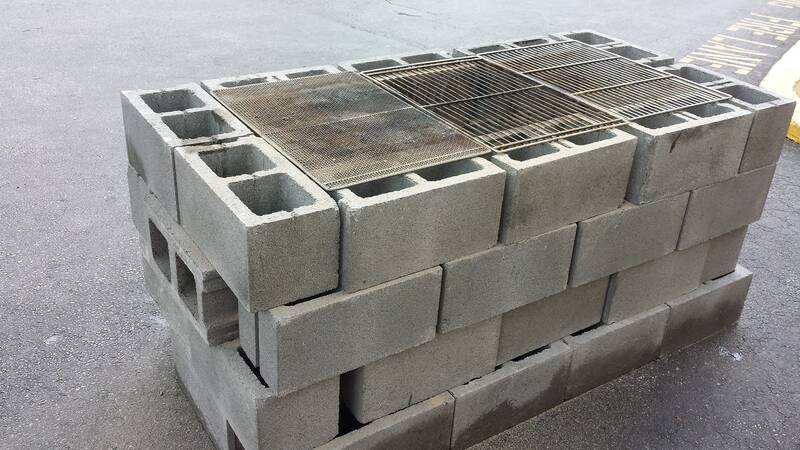
A great way to construct a sturdy fire pit that will stand the test of time is to use durable materials like concrete or cement. These can be stacked, buried, poured in, or mortared to create all different kinds of fire pits.
Cost: Concrete blocks typically range from $1 to $3 per block.
12. Stack Your Stones
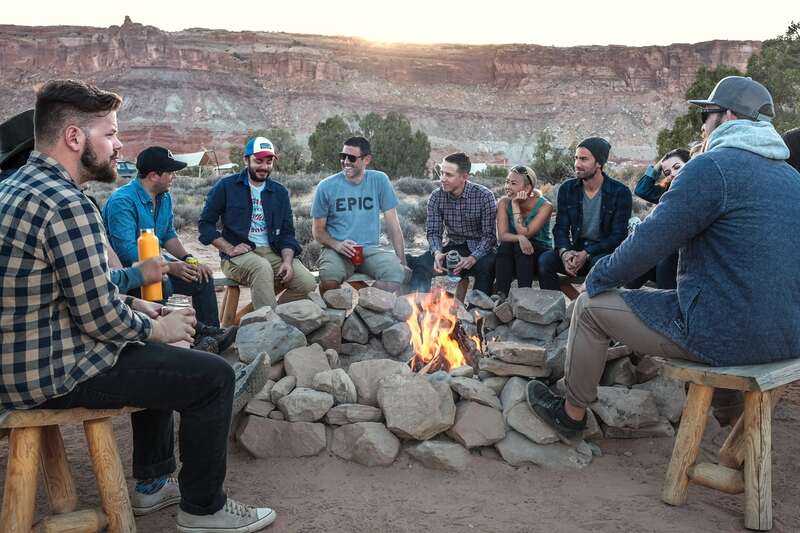
Using natural stones gives you endless options for fire pits. Everything from stacked slate to large limestone boulders can be used to shape your stone fire pit. Stacked stone brings a natural-looking fire pit that can quickly be built up and taken down to match the seasons.
Cost: These are free if you happen to have the stones on hand. If not, the right rocks for the job usually range from $100 to $600 per ton of rock.
13. Surround it With Gravel
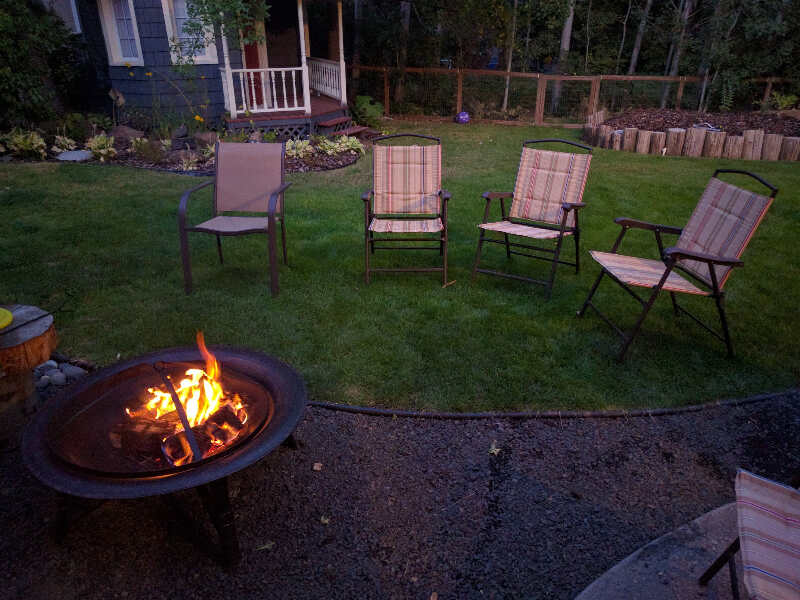
Gravel works well as a natural surrounding for a fire pit. It’s a great material to lay down around your fire pit since it won’t show any noticeable charring or ash stains if the fire is raging. Just don’t put any gravel in the fire pit itself. Gravel traps moisture that becomes steam and can explode in the heat of a fire.
Cost: Gravel can be bought by the bag for around $1 to $3 per square foot or in bulk for around $1,400 for a truckload.
14. Put Your Fire Pit on Sand
Sand is also a great medium for fire pits. It’s a must-have ingredient for the base of almost any fire pit, and it also works well surrounding the pit. So if you have a sandy shore on a lakefront or a sandy clearing, a simple fire ring can be thrown together in no time. All you’ll need is some rocks and a few lounge chairs.
Cost: This is another fire pit idea that can be pulled off for free. If you need rocks, a 10-pound bag of lava rocks can be had for $20.
15. Go Heavy Metal
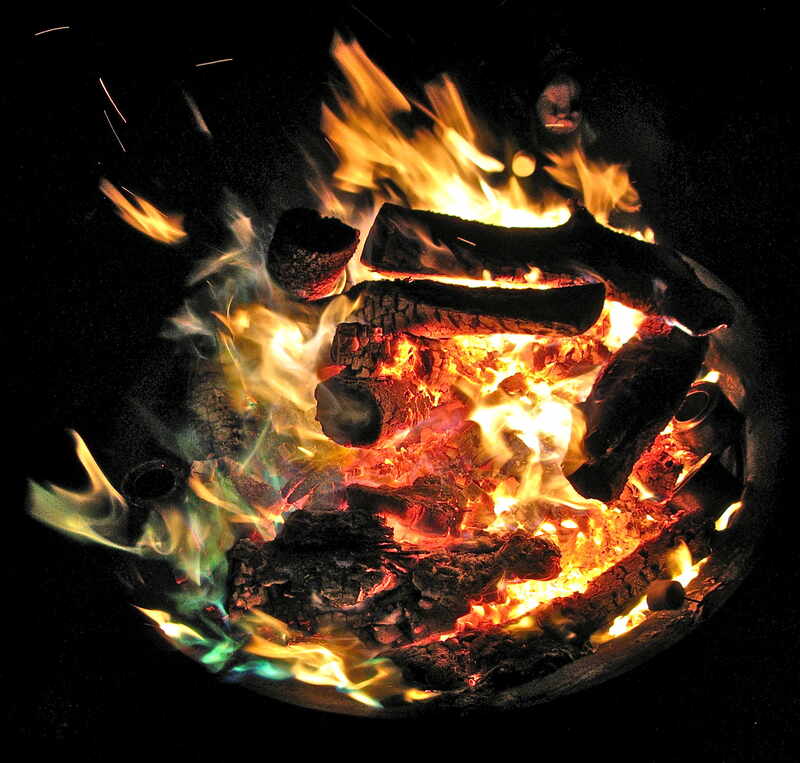
Metal fire pits come in all shapes and sizes. Metal can be manipulated for creative designs or work as a simple barrier for your in-ground fire pit. You can construct your own metal fire pit or find a stainless steel fire pit bowl online if metalwork isn’t your thing.
Cost: This is another no-cost fire pit idea if you’re able to make your own metal fire pit. If not, the cost of a metal fire pit ranges from $40 to $400.
16. Reuse Recycled Materials
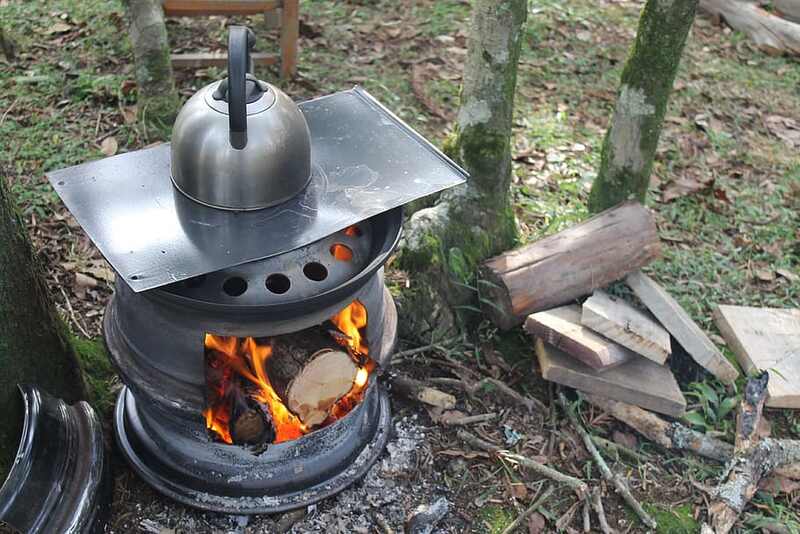
For those who prefer sustainable design ideas, build a fire pit using recycled materials. Using a washing machine drum and or a truck’s wheel rim gives you a way to upcycle used materials for your DIY fire pit project.
Cost: The idea is to recycle, so this fire pit idea shouldn’t cost you anything.
17. Build a Fire Pit in the Ground
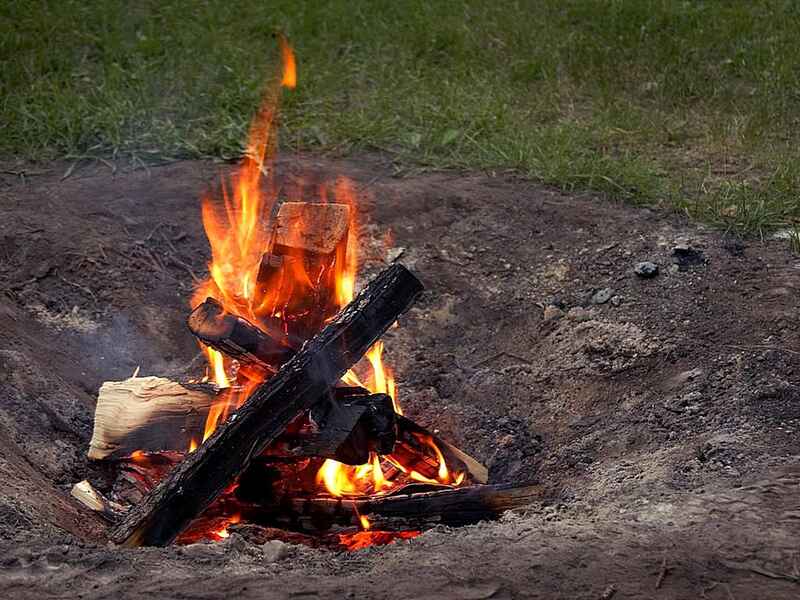
An in-ground fire pit is one of the easier DIY projects to execute. Simply dig a hole, lay down a border or retaining wall, and fire away. Putting the fire below the surface level should keep ash and embers from blowing around too much while allowing oxygen to feed the flames.
Cost: Another free option for adding a fire pit to your landscaping. All you’ll need is a shovel.
18. Form a Circle
The circular fire pit is a classic. It invites everyone to pull up an Adirondack chair and soak up the warmth from all angles.
Cost: Depending on the material you use, building a circular fire pit will range from free to thousands of dollars.
19. Or Pick Another Shape
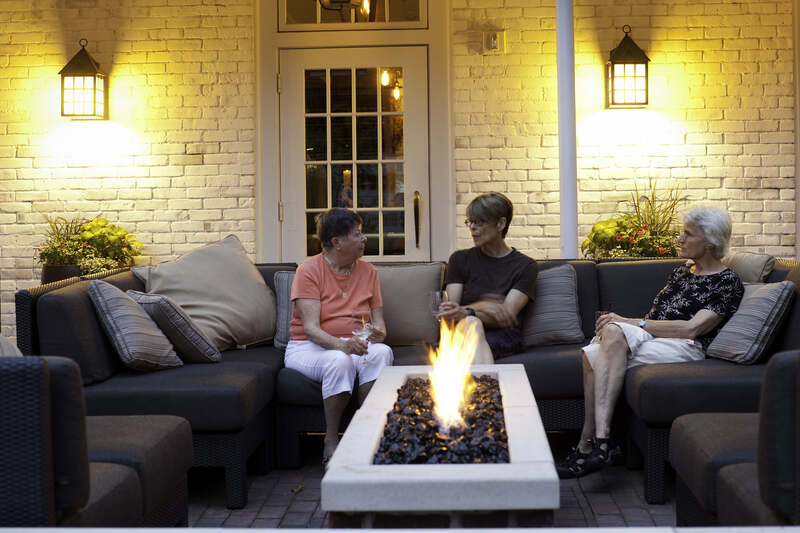
While the round fire pit is well known, there are plenty of other shapes to choose from. You might pick a square fire pit or rectangular fire pit to match a more linear outdoor area, or get creative and make your own designs. A concrete fire pit can be molded and sculpted to some very unique shapes.
Cost: Simple, homemade various-shaped fire pits can cost nothing, or custom pieces cost $4,000 or more.
20. Will it Burn Wood or Gas?
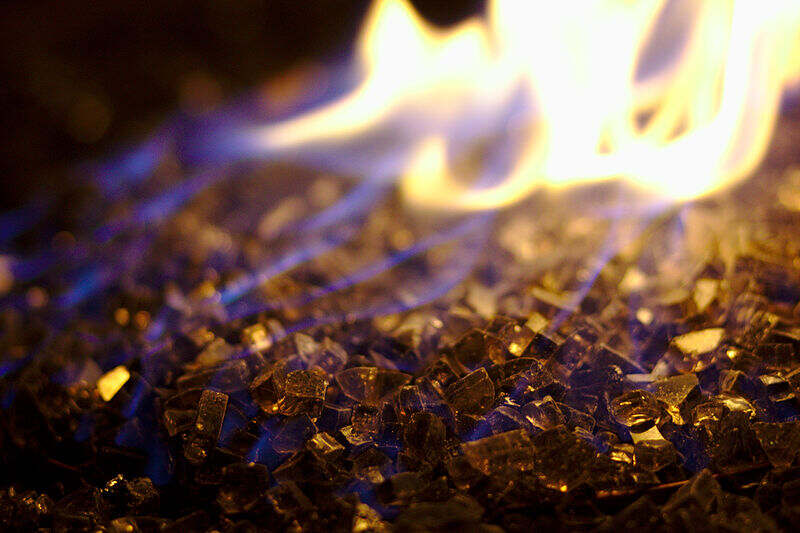
Wood-burning fires are most common, but you also might consider a propane fire pit. A propane fire pit will require more work, but the finished product will bring you fire on demand. In addition, you can use lava rocks or fire glass for an added touch that will make your natural gas fire pit look like magic.
Cost: You can find a simple, gas-powered fire pit for as low as $90 or as much as $1,000.
21. Use Your Fire Pit for Cooking (and Warmth)
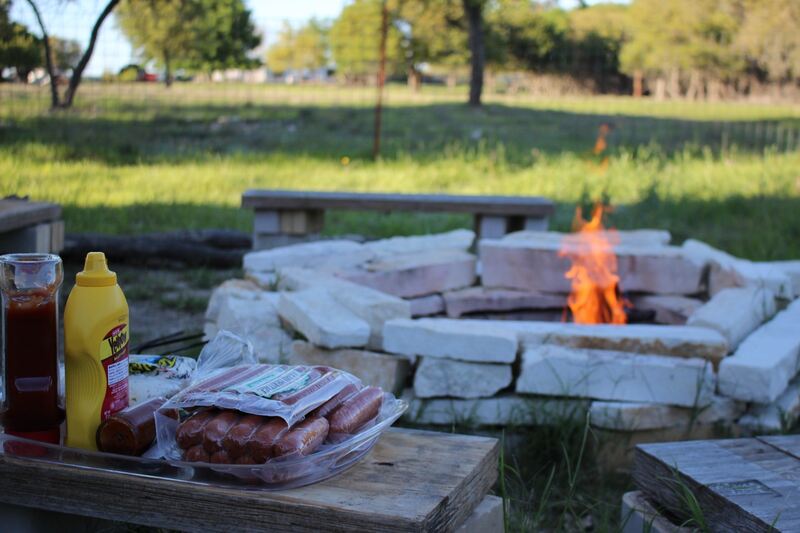
A fire pit that can double as a barbecue is the ultimate in versatile fire pits. When your own backyard fire pit works for both summer night barbecues and winter campfire circles, it becomes a go-to hangout spot all year long.
Cost: Any fire pit can be made into a makeshift hot dog cooker with a few twigs. For something more advanced, you can find cooking grates for fire pits ranging from $30 to $300.
Can a Fire Pit Be a Safety Hazard?
If a fire pit isn’t correctly installed or is left unattended, it can become a safety hazard. According to the National Fire Protection Association, it is a good idea to ensure that it is 10 feet away from anything surrounding it, including chairs and the house. Also, keep children and small pets 3 feet away from the pit. Finally, keep a fire extinguisher near in case a small fire erupts.
FAQ About Fire Pits
When it comes to wood-burning fire pits, it’s best to use hardwoods like oak, ash, and beech.
Fire bricks, crushed stone base, or dirt are popular base materials for the bottom of a fire pit.
Don’t! Pea gravel is highly porous and can trap moisture. In the flames of a fire, the trapped moisture turns to steam and causes the rocks to burst, potentially sending them showering out of the fire and onto you and your fellow fire watchers.
Yes, as long as the stone you use isn’t very porous, it should be fine to put at the bottom of the fire. Just make sure that you don’t need the stones for anything else since they will likely become permanently altered by the heat of the fire.
Lava rocks and fire pit glass are popular media for the inside of fire pits and are very commonly used with gas fire pits.
When to Call a Professional Landscaper
Picking your favorite backyard fire pit ideas will be easier than building one. However, even with a fire pit kit and a step-by-step tutorial, building a fire pit can be a difficult DIY outdoor makeover for most people.
If backyard pyrotechnics isn’t your thing, call a landscaping professional near you to help you realize your wildest fire pit dreams.
Disclaimer: This information is for educational purposes only. Consult a local professional for advice when planning your fire pit area.
Main Photo Credit: Pxfuel
